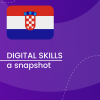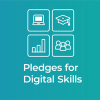Croatia - Schools of the Future
"Schools of the Future" project in Croatia was launched with the support of STEMI and Infobip, with the goal of connecting schools and the technology industry and build a community of like-minded individuals and organisations that can drive change in the Croatian education system.
But how was the idea born?
From a pilot to success: the story behind Schools of the Future
The project kicked off with the development of an AI-based STEAM programme in cooperation with Infobip, launched in December 2020. After the official announcement, schools, parents and teachers expressed further interest in the programme. Registration for the programme surpassed expectations and closed once 250 expressions of interest were received, ahead of the official deadline due to capacity considerations.
Out of the 250 schools that applied for the pilot programme, 60 schools, 1,000 pupils and 150 teachers from all over Croatia were selected to join a pilot programme that started in April 2021 and ended in July of the same year. After the success of the pilot programme, a new project started in January 2022, with a yet bigger outreach. The second edition of the programme reached even more participants: more than 2,000 students and 350 teachers were introduced to the world of Artificial Intelligence (AI).
"Just like a job in tech" - main benefits of the programme
The programme simulates working in a technology company. Students not only get a chance to try out how they feel about a career in tech: they can also learn straight from the STEMI and Infobip engineers on what it is like to work in digital technologies and leading IT companies. Through video examples, students also get the chance to learn more about some of the most popular emerging technologies that are on their way to change the world. The programme aims to inspire students to pass knowledge further, and find inspiration in the advances of technology to lead a new generation of inventors. As part of the programme, top scientists and industry experts make virtual visits to schools via a series of video lectures, enabling knowledge-exchange.
An agile & engaged community
The STEMI community in Croatia (a lead innovative learning experience platform) has enabled the development of the AI programme in a unique and scalable way. The entire programme was developed in collaboration with Infobip engineers and experts, and more than 1,000 teachers and students were closely involved in the design process. By applying a sound project methodology, comprising of agile methods and start-up approaches to product development, the time to create the AI-based programme was significantly reduced (from start to finish, the programme was developed over the course of just 5 months).
Cross-cutting soft skills: problem-solving using AI
The programme aims to offer a guide to students on how to use technology to solve key issues within their local communities, areas, and regions. The main theme of the programme is developing AI chatbot solutions for good.
Students are split into teams to analyse and discuss the UN Sustainable Development Goals (SDGs) and use design and computational thinking to solve challenges linked to those. Building a chatbot requires students to make use of industrial solutions and tools - and all projects are put online so they can be tested by the general public. In the second phase of the project, lessons learnt led the team to put a great emphasis on cooperation - this time, students from different schools were grouped together, and given the task to develop a chatbot for an NGO of their choice.
Schools also received free online mentoring sessions from Infobip employees (scientists and engineering experts) to support the development of AI-based solutions that are future-proof, useful, and can have an impact.
An annual conference to celebrate achievements and highlights
At the end of each edition, an annual conference takes place. Participants from all different levels of the programme (from students to experts in technology companies) all take part and present their projects. Those who join also get the opportunity to watch a series of motivational lectures from speakers across industry sectors; and try out the main technological solutions with AI currently being developed in Croatia. Over 350 teachers and students and 200 industry representatives attended the July 2022 edition of the conference.
Why is this a good practice?
Project activities are accessible and free of charge for schools (programmes are sponsored by technology companies from all over Croatia). This also means that the project in itself is sustainable - it has managed to secure funding and continue to operate in the field of digital skills and jobs. The project will be implemented in Croatia until 2025, increasing the number of participants every year and extending the programmes offered to schools. The project is also growing in the US and Great Britain, creating new and unique opportunities for teachers and students to work together. The increased interest with each next edition further demonstrates the positive impact of the programme in bridging the skills gap and ensuring the education system in Croatia equips students and teachers with skills for the digital transformation of the economy and society - together with subject knowledge.
The results clearly point to a success, with 4,000+ students and 500 teachers introduced to the world of AI.





